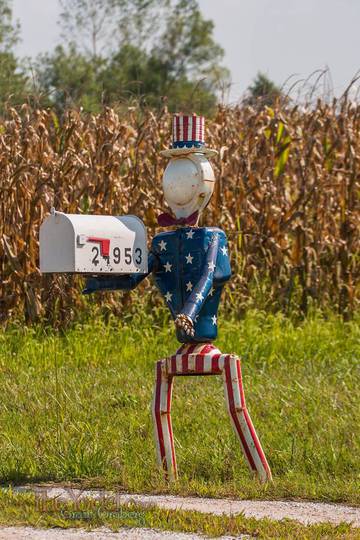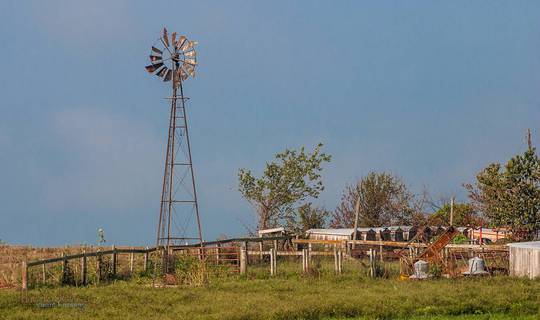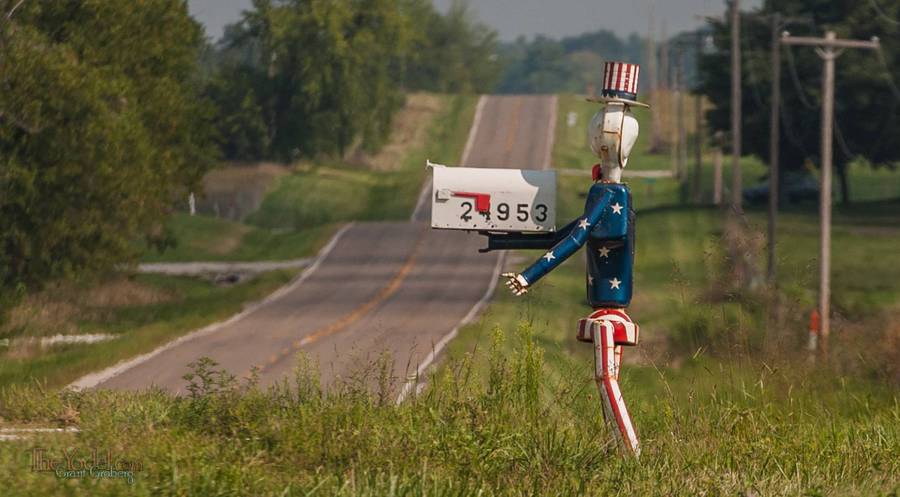To Kirksville, MO
Another beautiful morning in the Midwest. Can one weary of such things? The overcast of the previous day had moved on leaving a morning clear and bright. The smells were delightful and the sounds were a symphony. Crickets, tree frogs, and cicadas harmonized to sweetly serenade any passerby who happened to have their windows open as they drove. The clarity of the air and the light were uplifting.
Boonville was behind me, but before I left, I drove around to look again at the wonderful brick work in the morning light. Very nice. How I love nice brick stuff. And what a day I had in store for me! I crossed the river drove through New Franklin, more bricks! Oh gee, another town to drive about in and look at houses. Highway 5 joins with highway 87 in Booneville and together they crawl about where the Missouri River takes an upstream wiggle to the North. The little towns there, Estille and Fayette, are nice but when you get to Glasgow you are back to very nice. Glasgow has some lovely piles. Churches, homes and downtown.

There are some rules of thumb to use in these towns. If you want to see the nicest houses go up. The richest folk generally built on either the highest ground or the best view. I suppose I shouldn't be surprised about all of the brick, after all I was on a river that was--and still is--used for shipping. Back in the day... brick was used as a cheap ballast. The local ship owner always ended up with scads of the stuff, that was, for him, pretty much free. So he would build a house of it. With the only cost being that of labor, the ship owner could build a pretty nice house. Since the ship owner was often one the wealthiest people in town brick houses became an item of prestige and the masons found more and more creative ways to use up the stuff. Where was I? Ah, Glasgow and hills So I went to the top of the hill and was rewarded with a giant old pile hidden amongst much overgrown landscaping. This house had seen better days. It was immense, but there were obvious lapses in the maintenance. I am always curious about the stories of houses like this. What befell the fortunes of the descendents? Was the house even in the hands of the heirs yet? Some Victorian had built his castle there proclaiming his success to the world. Less than 150 years later--four or five generations--his castle was languishing. Had the family fortune been squandered? There was a half-rusted mini pickup in the driveway. Was this the family chariot? Oh, such mysteries.
The road meandered away from the river. Brick becomes less desirable as a building material when you have to haul it across any distance. Particularly when there are abundant woods nearby. Stick-built houses became the norm as much as empty space. The deeply rolling hills were being farmed. With crops at first shifting to mostly cattle after a while. At some point I tired of driving lines on paper and decided to go off-map. Off map is when the driving really gets fun. Dirt and gravel roads that you hope will continue in the direction they started. Finding odd crossroads and traveling down old tracks that turn the bend into a wonderful vista and then dead end forcing you to backtrack ten miles with a smile on your face. Eventually you find blacktop again and follow it to a place that is more civilized. Civilization being defined as an abandoned gas station and defunct country store. Follow the blacktop further and you will run into a wider road, this one with a line painted down the middle. If you keep choosing the wider roads you will eventually find a town, then a city, some place big enough for a hotel and you can get a room.
Whilst I was driving round and about I saw a stand of cedar trees that, for some reason caused me to think about a man I knew in Missouri. Originally from Kansas, he spoke in a lovely, broad, soft dialect. He was 80 at that time. Everybody was an "old friend." He had a Tractor Graveyard that I wrote an article about. I bought a few pieces of equipment from him. I was new to the farm equipment thing. I didn't know what anything was worth and what one should pay. I always accepted his first price, because the price sounded good to me. Well, I guess he figured I would be bargaining him down but I never did. By the third piece of equipment I bought from him he felt sorry for me and was bargaining himself down.

"How much for that old plow?"
"Oh, that? Three-hundret, fifty dollars." Then he would take a look at me and remember I was that guy who never dickered. "Well, yep, no, that one is three... no two hundert, seventy-five."
One day I was over looking at equipment and just spending time with him. He bent down and pulled a tiny cedar sapling out of the ground with a pair of vice grips. "When I first come here, I was amazed by the cedar trees. The part of Kansas I come out of didn't have many trees at all. And these was green all year long. Yeap. That time I wouldn't never thought what I'd pull em up as I just did. But they grow near everywhere and if you don't get at them quick you'll have a forest on yer hands."


 To Kirksville, MO
To Kirksville, MO